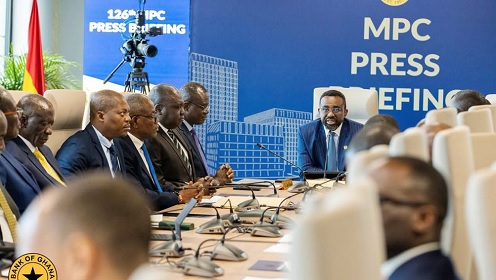The Monetary Policy Committee (MPC) of the Bank of Ghana (BoG) has cut the rate at which it lends to commercial banks, otherwise known as the policy rate, by 350 basis points to 21.5 per cent, the lowest since October 2022.
The rate, which is a reduction from the 25 per cent, was due to sustained disinflation, robust growth and stronger external buffers.
The reduction is expected to enable financial institutions to lend more and at cheaper rates to many segments of the economy to enhance business operations and create jobs for many Ghanaians.
Speaking at a press conference in Accra yesterday after the 126th MPC meeting, the Governor of BoG, Dr Johnson Pandit Asiama, explained that the decision to reduce the rate was supported by a majority of committee members.
“And this reflects prudent managing policy, effective liquidity management, fiscal consolidation, and increased foreign exchange inflows.
“So, given the current state of macroeconomic conditions, the view of the committee was that inflation will continue to ease in the near term.
And in the outlook, headline inflation is expected to drop to within the median time target of eight plus or minus two per cent by the end of the fourth quarter,” he said.
Dr Asiama said the committee held the view that inflation would continue to ease in the short term, and going forward, headline inflation was expected to settle within the medium-term target band of eight per cent, plus or minus two, by the end of the fourth quarter.
“However, the possible upward period of utility tariffs could exert some price pressures in the medium term,” the Governor cautioned.
That notwithstanding, he added, the maintenance of an appropriate monetary policy stance, strong stabilisation efforts, ongoing fiscal consolidation, and adequate reserve efforts should sustain the inflation process.
Global slowdown
Dr Asiama explained that, contrary to earlier predictions of a global economic slowdown, growth had been resilient, supported by a modest tempering of the tensions associated with the tariff wars, robust exports in the first quarter of the year, easing credit conditions and fiscal expansion in some advanced economies.
He said against that backdrop, the International Monetary Fund (IMF) revised its global growth projections for 2025 to three per cent, compared with earlier forecasts of 2.8 per cent.
“In addition, global financing conditions have eased somewhat, supported by declining policy rates, lower long-term home yields, and a strong rebound in portfolio flows to emerging markets and developing economies,” he said.
Domestic front
On the domestic front, the Governor said the economy continued to demonstrate strong growth, driven largely by the services and agriculture sectors.
Dr Asiama said the latest release from the Ghana Statistical Service for the second quarter of 2025 showed the economy posting a real Gross Domestic Product (GDP) growth of 6.3 per cent, compared with 5.7 per cent recorded in the same quarter of 2024.
“Now, excluding oil, GDP grew at a much faster pace, by 7.8 per cent, relative to 5.7 per cent over the same comparative period.
The services sector grew by 9.9 per cent, while the agriculture sector expanded by 5.2 per cent. The bank's high frequency indicators continue to point to sustained momentum in economic activity”.
“The Composite Index of Economic Activity recorded an annual growth of 6.1 per cent in July 2025, compared to 1.9 per cent in July 2024, on the path of international trade activities, consumption, and industrial production,” he said.
Confidence survey
Dr Asiama stated that the latest confidence survey conducted in August 2025 also reflected sustained improvement in sentiments.
Similarly, the Purchasing Managers Index went up in August, signalling an increase in new orders as business conditions improved.
Headline inflation
He said headline inflation declined further to 11.5 per cent in August 2025, down from 12.1 per cent in July, the lowest reading in four years.
He said the sustained decline in inflation for eight consecutive months was largely driven by a combination of factors, including the prudent monetary policy stance, strong liquidity management, appreciation of the cedi, fiscal consolidation, and improved food supply.
He said the bank's main core inflation measure, which excludes energy and utility items, also declined, reflecting continued easing of underlying inflationary pressures.
He added that inflation expectations among consumers, businesses, and the banking sector all eased, affirming the disinflation process going forward.
Interest rate
Interest rates were declining on the money market in response to the recent cut in the monetary policy rate, while the overall fiscal deficit on a commitment basis was 1.1 per cent of GDP, outperforming the target deficit of 2.1 per cent of GDP.
Public debt
At the end of July 2025, Dr Asiama said the total public debt stood at 44.9 per cent of GDP, down from 61.8 per cent of GDP at the end of December 2024.
